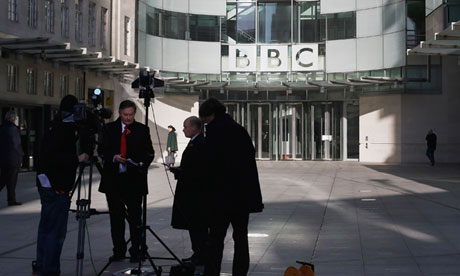BBC director general should not be stripped of editor-in-chief role
George Entwistle was not the first BBC chief to fall on his sword for mistakes he had nothing to do with. But the royal charter should not be rewritten in haste during a crisis
 |
A TV crew set up
outside BBC headquarters in London following the resignation of George
Entwistle as director general. Photograph: Alastair Grant/AP
|
It is one of the curiosities of the BBC that its director general is also its editor-in-chief. The secondary job title, only ever remembered in moments of crisis, does foster the unhelpful image of the DG spending half their time wandering around the newsroom wearing a green eyeshade, as well as being chief executive of one of the world's biggest broadcasters.
On that basis, it would be an impossible task. The BBC last week said it produced 425,320 hours of TV and radio output last year – or 1,165 hours a day. And then there's the BBC's considerable online output. No director general, however adept or floundering, can manage to watch more than a tiny fraction; Greg Dyke never heard Andrew Gilligan's report at a few minutes past 6am on the Today programme that sparked the "sexed-up" dossier row with Tony Blair's government in 2003. And apparently George Entwistle paid little attention to last Friday's Newsnight.
The BBC Trust chairman, Lord Patten, told Andrew Marr on Sunday morning there might be a case for looking at the editor-in-chief role and the "relationship between director general [and] editorial and creative". But as the dual job title is written into the BBC's royal charter – not due for renewal until 2017 – it is hard to see how it can be changed. Nor should it be.
The corporation's constitution is not to be rewritten by politicians in haste in the aftermath of a crisis; that would amount to interference. Those who want to argue that the BBC is ungovernable may say shedding the job title is only the beginning of a debate on cutting the size of the national broadcaster.
Those familiar with Patten's thinking are saying he does not want to strip out the secondary job title – his BBC Trust has already looked at that – but perhaps move the BBC closer to the model used at ITV, where there is a chief executive, former Royal Mail Group boss Adam Crozier, and a senior editorial figure, director of television, Peter Fincham.
Anyway, editorial responsibility at the BBC is devolved, not least to Helen Boaden, the BBC News director, and then to the editors of individual news programmes, the Six and Ten O'Clock News, Newsnight and Panorama.
It is those editors who have to take day-to-day responsibility for errors as well as running orders – although, as Dyke and Entwistle have found, when a piece of BBC journalism is as flawed as the Newsnight report, it then does become a problem for the person at the top. The devolution is realistic and necessary; no media organisation would function without it.
Rupert Murdoch likes to read and influence the newspapers at the company he part owns and runs. Some describe him, informally, as the editor-in-chief of newspapers such as the Sun. No doubt he too should have known what was going on at the News of the World. Yet even Murdoch would not describe himself as chief executive and editor-in-chief on his business cards, even though his day-to-day input is far greater than a BBC chief's.
But although the editor-in-chief title for the BBC's leader is flawed, it should not be tossed aside because of editorial failings across BBC News. Newsnight's mistakes were not the product of a job title; in the case of the McAlpine misidentification at least, they were the product of basic errors of journalism. Training and common sense are needed to deal with that.
More links?
Odds on who's going to succeed Entwistle - my money is on Ed Richards (if the Tory gov can stomach an ex-Labour man that is)

No comments:
Post a Comment
Comments and suggestions are very welcome ... but please ensure all comments are appropriate! All comments are moderated before publication. Spam will be reported